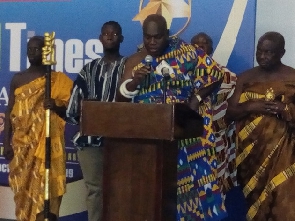 Akwamumanhene, Odeneho Kwafo Akoto III
Akwamumanhene, Odeneho Kwafo Akoto III
The Akwamumanhene, Odeneho Kwafo Akoto III, has admonished the leaders of tomorrow to make culture their foundation upon which other qualities develop. According to him, future leaders must be educated primarily to understand, accept, and respect their culture. Explaining why leaders must take pride in their origins, he underscored that “[culture] is the foundation on which every other quality must stand.” Quoting a Ghanaian adage, he argued that “a tree without roots cannot stand” adding that “to operate as global citizens in a modern world, we must accept that future leaders must be educated to have roots [culture] and wings at the same time.” The Akwamumanhene made the following remarks at the 60th Anniversary celebration of Akosombo International School as Chairman of the function. Speaking on the theme: ‘Educating tomorrow’s leaders today’, he posed two relevant questions for both educators and other stakeholders to ponder on. “Going by the theme, the first question that springs to mind is “why must we educate future leaders today?” Simply put, we must do so because it is essential to our survival as a nation. We cannot afford to wait until these young people become adults before attempting to instil leadership qualities in them,” he said. He, therefore, called on educators to inspire young people under their tutelage to develop skills that last a lifetime by setting high expectations of themselves to pursue the type of dreams that place them in positions to be positive role models. “You must instill in them the ability to become independent, competent knowledgeable individuals with advanced work ethics”, he counselled. Present at the occasion were Nana Baffour Awuah, Director at the Ministry of Education, who represented the President, Nana Akufo-Addo, and the Minister of Education, Dr, Yaw Osei Adutwum. Others are the Chief Executive Officer and Board of Director of the VRA, Nananom of Akwamu and its surrounding communities among others including Old and current students of Akosombo International School (AIS).
The Akwamumanhene, Odeneho Kwafo Akoto III, has admonished the leaders of tomorrow to make culture their foundation upon which other qualities develop. According to him, future leaders must be educated primarily to understand, accept, and respect their culture. Explaining why leaders must take pride in their origins, he underscored that “[culture] is the foundation on which every other quality must stand.” Quoting a Ghanaian adage, he argued that “a tree without roots cannot stand” adding that “to operate as global citizens in a modern world, we must accept that future leaders must be educated to have roots [culture] and wings at the same time.” The Akwamumanhene made the following remarks at the 60th Anniversary celebration of Akosombo International School as Chairman of the function. Speaking on the theme: ‘Educating tomorrow’s leaders today’, he posed two relevant questions for both educators and other stakeholders to ponder on. “Going by the theme, the first question that springs to mind is “why must we educate future leaders today?” Simply put, we must do so because it is essential to our survival as a nation. We cannot afford to wait until these young people become adults before attempting to instil leadership qualities in them,” he said. He, therefore, called on educators to inspire young people under their tutelage to develop skills that last a lifetime by setting high expectations of themselves to pursue the type of dreams that place them in positions to be positive role models. “You must instill in them the ability to become independent, competent knowledgeable individuals with advanced work ethics”, he counselled. Present at the occasion were Nana Baffour Awuah, Director at the Ministry of Education, who represented the President, Nana Akufo-Addo, and the Minister of Education, Dr, Yaw Osei Adutwum. Others are the Chief Executive Officer and Board of Director of the VRA, Nananom of Akwamu and its surrounding communities among others including Old and current students of Akosombo International School (AIS).